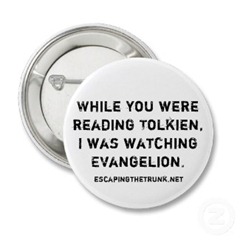 I’ve been letting news about the Tolkien estate’s chilling effect on creative efforts involving Tolkien’s name or works pile up without reporting on it because most of it doesn’t seem to relate directly to e-books, but enough of it has accreted that it has reached critical mass, so I’m going to touch on all of it at once.
I’ve been letting news about the Tolkien estate’s chilling effect on creative efforts involving Tolkien’s name or works pile up without reporting on it because most of it doesn’t seem to relate directly to e-books, but enough of it has accreted that it has reached critical mass, so I’m going to touch on all of it at once.
After all, it wouldn’t feel right not to give it at least a Tolkien effort.
In Soviet Russia, rings lord you! – I caught a note on Galleycat a couple of weeks ago that a fan has translated a 139,000-word Russian novel, written in 1999, that reimagines Tolkien’s Lord of the Rings as a history written by the victor, and relates the story of the war from Mordor’s perspective. The translation is available for download as a free e-book. (The translation was done with the assistance and approval of the author.)
The translator explained his his labor of love (published for non-commercial distribution only): “Several publishing houses have considered a commercial translation of this book, which had been published in several major European languages, but abandoned the idea out of fear of the Tolkien estate, which rigidly controls all derivative works, especially in English.”
A piece in The Guardian (found via Techdirt) suggests that the Tolkien estate may indeed be primed to go after it, so best download it while you can. (Or find it on peer-to-peer later.) A quote from the article seems to say about all that need be said the estate’s way of thinking. David Brawn, estates publisher at Tolkien-exclusive publisher HarperCollins, explained, “Tolkien himself isn’t around so it’s the estate’s view that it’s best to say no to everything. If you let one in, you’d open the floodgates.”
Is Tolkien history? – And if he is, can you write historical fiction featuring him? On Techdirt, Mike Masnick writes about a spat between author Stephen Hilliard and the Tolkien estate over a work of historical fiction Hilliard has written involving a fictionalized version of J.R.R. Tolkien. Historical fiction involving public figures, especially deceased ones, has long been considered fair game, but Tolkien’s estate is notoriously overprotective of his legacy.
After the estate sent a cease-and-desist letter alleging “unfair competition” and a violation of Tolkien’s publicity rights, Hilliard filed suit preemptively to have his book declared legal. If the Tolkien estate prevails, it could have serious repercussions for the historical fiction genre in general.
 Button up about Tolkien already. Or better yet, don’t. – And in the straw that broke the camel’s back, BoingBoing links the story of a fan who created a button on make-your-own-button site Zazzle.com that quoted a tweet from an on-line discussion: “While you were reading Tolkien, I was watching Evangelion.”
Button up about Tolkien already. Or better yet, don’t. – And in the straw that broke the camel’s back, BoingBoing links the story of a fan who created a button on make-your-own-button site Zazzle.com that quoted a tweet from an on-line discussion: “While you were reading Tolkien, I was watching Evangelion.”
This is just the sort of button that fans and fan-run companies like to make, and that you often find at science fiction convention dealer rooms. My own jacket is adorned with a number of buttons like that, featuring clever slogans like “Sure, drinking kills brain cells (but only the weak ones)” or quoting catchphrases from popular culture such as “You can’t take the sky from me.”
However, recently Zazzle informed this fan that they would have to pull the button from sale due to an objection from the Tolkien estate. Apparently they didn’t like the name “Tolkien” being used, and even though the button does nothing more than use Tolkien’s name in context of a discussion about pop culture, Zazzle doesn’t earn enough from selling the buttons to make it worthwhile to stand up for them.
Weirdly, if one follows a link to Zazzle.com, one still finds 38 buttons relating to Tolkien up for sale. With some of these, the connection is rather vague, but some include recognizable slogans and catchphrases straight out of the books, such as “All who wander are not lost.” One would think that if they didn’t want people profiteering from Tolkien’s name, they would have been a bit less selective in their enforcement. Perhaps they just didn’t like the comparison to Evangelion.
At any rate, it’s rather appropriate that Zazzle is the original source of the button image I often link for censorship stories such as this one (and also have on my jacket, in fact). “The worst part of censorship is [SCRIBBLE].” You said it, Zazzle. You said it.
































